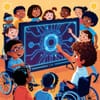Artificial intelligence (AI) is revolutionizing special education, offering tailored support and empowerment for students with diverse needs. Dr. Cynthia Breazeal, a renowned researcher, shares her insights on AI's potential to transform special education.
AI-powered tools provide personalized learning experiences, adapting to individual students' requirements. This customized approach fosters engagement, builds confidence and enhances academic outcomes. AI-driven assessments also help educators identify learning gaps, informing targeted interventions.
AI-driven technologies, such as speech-to-text systems and augmented reality, increase accessibility for students with disabilities. These innovations enable inclusive learning environments, promoting social interaction and equal participation. By leveraging AI, educators can create customized learning plans that cater to each student's unique needs.
The integration of AI in special education also addresses teacher shortages and workload concerns. AI supplements teacher efforts, providing valuable support and data-driven insights. This enables educators to focus on what matters most – providing personalized attention and guidance to their students.
As AI continues to evolve, researchers envision seamless integration with existing educational frameworks. Dr. Breazeal emphasizes the importance of collaborative development between educators, researchers and AI experts to ensure effective implementation. Rigorous evaluation and validation of AI-driven tools are also crucial.
AI's transformative potential in special education is undeniable. By harnessing its power, we can create inclusive, supportive learning environments that empower students with diverse abilities to thrive. The future of special education looks brighter than ever, thanks to AI's revolutionary impact.


